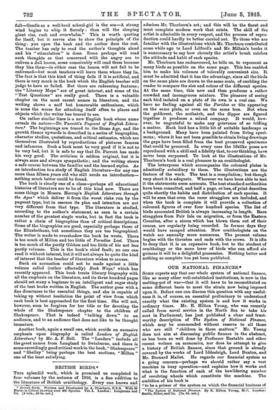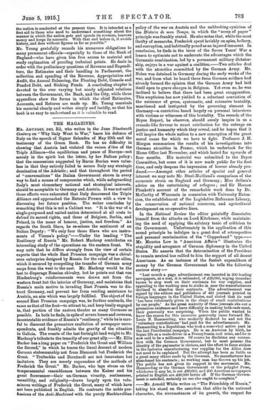OUR NATIONAL FINANCES.*
SOME experts say that our whole system of national finance, like so many other well-established institutions, is now in the melting-pot of war—that it will have to be reconstituted on some different basis to meet the strain now being imposed upon it. Before one can discuss this question with any useful- ness it is, of course, an essential preliminary to understand exactly what the existing system is and how it works in ordinary times. Mr. E. Hilton Young, who was recently called from naval service in the North Sea to take his seat in Parliament, has just published a clear and trust- worthy description of The System of National Pinanea which may be commended without reserve to all those who are still" children in these matters." Mr. Young does not aim at discussing public finance in the abstract, as has been so well done by Professor Beatable and other recent writers on economics, nor does he attempt to give a history of British finance, since that ground is already covered by the works of Lord Iddesleigh, Lord Buxton, and Mr. Bernard Mallet. He regards our financial system as a going concern—perhaps we should rather say a vast machine in busy operation—and explains how it works and what is the function of each of the bewildering number of revolving wheels which constitute the machine. The ambition of his book is "to be a primer of the system on which the financial business of • Ths System of Notsonal Blotto.. By E. 1111ton Young, 71.P. London: Smith. Elder. and Co. [7s. 04. nat.] the nation is conducted at the present time. It is intended as a first ait to those who need to understand something about the manner in which the nation gets and spends its revenue, borrows money and keeps its accounts. With that end before it, it avoids history, and does without figures as far as possible."
Mr. Young gratefully records his numerous obligations to many permanent officials—especially to those of the Bank of England—who have given him free access to material and ready explanation of puzzling technical points. He deals in order with the preliminary questions of Revenue and Expend'. tare, the Estimates and their handling in Parliament, the collection and spending of the Revenue, Appropriation and Audit, the Annual Balancing, the Floating Debt, Consols and Funded Debt, and Sinking Funds. A concluding chapter is devoted to the ever varying but nicely adjusted relations between the Government, the Bank, and the City, while three appendices show the forms in which the chief Estimates. Accounts, and Returns are made up. Mr. Young marshals his material clearly and writes simply and lucidly, so that his book is as easy to understand as it is valuable to read.



































 Previous page
Previous page